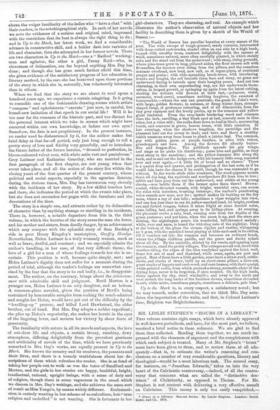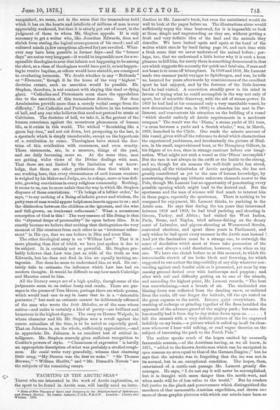MR. LESLIE STEPHEN'S "HOURS IN A LIBRARY."* This volume contains
eight essays, which have already appeared in well-known periodicals, and have, for the most part, we believe, received a brief notice in these columns. We are glad to find them thus collected. Reading them together, we are much im- pressed with the closeness of argument and the completeness with which each subject is treated. Many of Mr. Stephen's "hours" must have been given to them, and to review them at all ade- quately—that is, to estimate the writer's reasoning and con- clusions on a number of very considerable questions, literary and theological—would be a most laborious task. The second essay, for instance, on "Jonathan Edwards," takes us into the very heart of the Calvinistic controversy,—indeed, of all the contro- versy that concerns what are called the "distinctive doc- trines" of Christianity, as opposed to Theism. For Mr. Stephen is not content with delivering a very effective assault on Calvinism. This enemy is only too easily vanquished,—
• Hours in a Library. Second Series, By Leslie Stephen. London: Smith Elder, and Co. 1876. vanquished, we mean, not in the sense that the tremendous hold which it has on the hearts and intellects of millions of men is ever appreciably weakened, but that it is utterly put out of court, in the judgment of those to whom Mx. Stephen .appeals. It is only necessary to get a writer who, like Jonathan Edwards, does not shrink from stating the logical consequences of his creed ; and all cultured minds (a few exceptions allowed for) are revolted. What- ever may have been possible in former days—and the "former days" are notso very long past—it would be impossible now for a re- sponsible theologian to aver that infants not happening to be among the elect, as a class of theologians would haveputit, ornot happCn- ingto receive baptism, as others would have statedit, are consigned to everlasting torments. We doubt whether in any " Bethesda " or "Ebenezer," though it be the home of the very " highest " .doctrine extant, such an assertion would be possible. Mr. Stephen, therefore, is not content with slaying this dead or dying giant. "Catholics and Protestants must share the opprobrium due to the assertion., of this tremendous doctrine. Nor does .Arminianism provide more than a. merely verbal escape from the difficulty." For Catholics and Protestants believe in the torments of hell, and any one who believes that need not pretend to strain at Calvinism. The doctrine of hell, we take it, la fhe protest of the human conscience against the monstrous phenomena of human life, as it exists in this world. The wicked "flourishing like a green bay-tree," and not cut down, but .prospering to the last, is a spectacle which is simply unendurable, except on the hypothesis of a retribution to come. Theologians have stated the. doc- trine of this retribution with coarseness, and even cruelty. Those statements, are, in a measure, things of the past, and are daily becoming more so. At the same time, men are getting wider views of the Divine dealings with. man. That these are not limited by the limitation of our know- ledge, that there ass other probations than that which we see working here, that every circumstance of each human creature is weighed by his Maker and Judge, are, in a shape, more or less defi- nite, growing convictions in every religious community. Nothing, it seems to us, can be more unfair than the way in which Mr. Stephen disposes of these convictions. "To beings of `a loftier order," he says, "to say nothing of a Being of infinite power and wisdom, the petty race of man would appear helpless as insects appear to us ; and the distinction between the children or the ignorant, and the wise and full-grown, an irrelevant refinement." What a monstrous conception of God is this ! The very essence of His Being is that the "abysmal deeps of personality" lie open before Him. It is exactly because we believe that nothing that distinguishes the very meanest of His creatures from each other is an "irrelevant refine- ment" in His eye, that we can believe in Him and trust Him.
The other theological essay is on "William Law." That it is more pleasing than that of which we have just spoken is due to its subject. It . is certainly not so powerful, Mr. Stephen pro- bably believes that Law was just as wide of the truth. as was Edwards, but he does not find in. him an equally inviting an- tagonist. Nor does he seem to understand_ hint so well. He cer- tainly fails to estimate the influence which Law has had on modern thought. It would be difficult to say how much Coleridge and Maurice owed to him.
All the literary essays are of a high quality, though some of the judgments seem to us rather hasty and crude. There are pas- sages in the poems of Tom Moore, perhaps there are whole poems, which would lead one to say in haste that he is a "detestable poetaster ;" but such an estimate cannot be deliberately affirmed of the man who wrote the Irish Melodies, or of the man whose satires—and satire is certainly a kind of poetry—are brilliant and humorous in the highest degree. The essay on Horace Walpole, in whose character and life Mr. Stephen sees a revolt against the coarse animalism of the time, is to be noted as especially good. That on Johnson is, on the whole, sufficiently appreciative,—and to appreciate Dr. Johnson is an excellent test of critical in- telligence. Mr. Stephen scarcely gives sufficient recognition to Crabbe's powers of style. "Clumsiness of expression" is hardly an appropriate description of:what was probably a studied rough- ness. He could write very gracefully, witness that charming little song, "My Damon was the first to wake." "Sir Thomas Browne," "William Hazlitt," and "Mr. Disraeli's Novels " are the subjects of the remaining essays.































 Previous page
Previous page